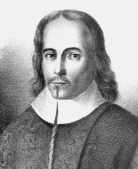| Revision as of 10:28, 5 November 2008 edit190.21.87.162 (talk) in the Republic used the Romance names!← Previous edit | Revision as of 10:49, 5 November 2008 edit undoDirector (talk | contribs)Autopatrolled, Extended confirmed users, Pending changes reviewers58,714 edits I'm sure you think so...Next edit → | ||
| Line 3: | Line 3: | ||
| '''Junije (Džono) Palmotić''', (also ''Junius Palmotta''; ], November 7th ] - Dubrovnik, July 6th ]) was a ] ] writer, nobleman, and dramatist from the ] (today ]). | '''Junije (Džono) Palmotić''', (also ''Junius Palmotta''; ], November 7th ] - Dubrovnik, July 6th ]) was a ] ] writer, nobleman, and dramatist from the ] (today ]). | ||
| The Junije's parents were Džore (Georgius |
The Junije's parents were Džore (Georgius) Palmotić and Ora (Uršula) Gradić, who was related to the ] family. Ore was close cousin of Dživa, the mother of great poet ], which made Junije his nephew. Ore and Džive were the daughters of two Gradić's (brothers Pavlo and Miho). He had an older brother Džore and younger Ivan, who died young in his childhood. | ||
| Not much is known about his schooling, but we know that he must have attended city school as it was mandatory for male nobles. We know that he attended a private school which was opened in 1619 by the Jesuits and in which, for the next few generations, was lectured by the |
Not much is known about his schooling, but we know that he must have attended city school as it was mandatory for male nobles. We know that he attended a private school which was opened in 1619 by the Jesuits and in which, for the next few generations, was lectured by the ], ], ], ] and ]. As Palmotić's teachers in that school, Stjepan Gradić especially mentions Ignjat Tudišević and Senese Italian, Camillo Gori. | ||
| When he was eighteen years old he became a member of the Great Council in the ]. He began to write while still young, writing like continuator the tradition of ] inspired by ], ], ] and ]. Although influenced by the ] literary tradition, Palmotić wrote in his native ]. | When he was eighteen years old he became a member of the Great Council in the ]. He began to write while still young, writing like continuator the tradition of ] inspired by ], ], ] and ]. Although influenced by the ] literary tradition, Palmotić wrote in his native ]. | ||
| Line 19: | Line 19: | ||
| ==References== | ==References== | ||
| * {{cite book |title=Junije Palmotić, Izabrana djela |editor=Rafo Bogišić |series=Stoljeća hrvatske književnosti |publisher=] |year=1995 |location=Zagreb |chapter=Ljetopis Junija Palmotića |pages=pp. 33-41}} | * {{cite book |title=Junije Palmotić, Izabrana djela |editor=Rafo Bogišić |series=Stoljeća hrvatske književnosti |publisher=] |year=1995 |location=Zagreb |chapter=Ljetopis Junija Palmotića |pages=pp. 33-41}} | ||
| * (1802) ''Notizie istorico-critiche sulle antichita storia e letteratura de' Ragusei'', Author Francesco Maria Appendini, pg. 235 * | |||
| {{wikisourcelang|hr|Junije Palmotić}} | {{wikisourcelang|hr|Junije Palmotić}} | ||
Revision as of 10:49, 5 November 2008

Junije (Džono) Palmotić, (also Junius Palmotta; Dubrovnik, November 7th 1608 - Dubrovnik, July 6th 1657) was a Croatian baroque writer, nobleman, and dramatist from the Republic of Ragusa (today Dubrovnik).
The Junije's parents were Džore (Georgius) Palmotić and Ora (Uršula) Gradić, who was related to the Gundulić family. Ore was close cousin of Dživa, the mother of great poet Ivan Gundulić, which made Junije his nephew. Ore and Džive were the daughters of two Gradić's (brothers Pavlo and Miho). He had an older brother Džore and younger Ivan, who died young in his childhood.
Not much is known about his schooling, but we know that he must have attended city school as it was mandatory for male nobles. We know that he attended a private school which was opened in 1619 by the Jesuits and in which, for the next few generations, was lectured by the Ivan Gradić, Ignjat Tudišević, Marin Gundulić, Ivan Dražić and Bartul Kašić. As Palmotić's teachers in that school, Stjepan Gradić especially mentions Ignjat Tudišević and Senese Italian, Camillo Gori.
When he was eighteen years old he became a member of the Great Council in the Republic of Ragusa. He began to write while still young, writing like continuator the tradition of Ivan Gundulić inspired by Ovid, Virgil, Tasso and Ariosto. Although influenced by the Latin literary tradition, Palmotić wrote in his native Croatian language.
He translated the Christias di Girolamo Vida, the Christiade, "Illyrian" poem in 24 verses, that was posthumously published in Rome 1670.
Although his poetry is melodramatic and deals primarily with mythological topics, his drama focuses on contemporary Dubrovnik, particularly the life of the aristocracy.
He was fortunate to have a great friend your nephew, in the form of Stjepan Gradić, ambassador and Vatican librarian, who wrote about his life, supplying precious material to the future biographers.
All the works of Palmotić were published by the end of the XIX century, by the Croatian Cultural Association
References
- Rafo Bogišić, ed. (1995). "Ljetopis Junija Palmotića". Junije Palmotić, Izabrana djela. Stoljeća hrvatske književnosti. Zagreb: Matica hrvatska. pp. pp. 33-41.
{{cite book}}:|pages=has extra text (help)